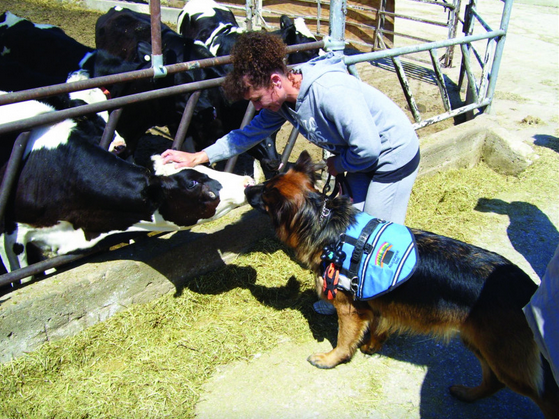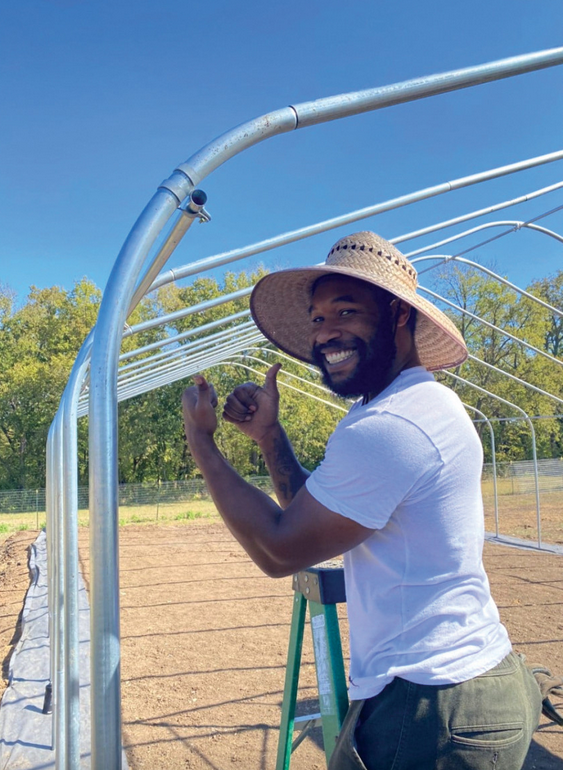
Program aims to help soldiers transition from military to civilian life
By RICK MCNARY
Kansas Living
When standing on a hill overlooking a timber-lined valley of the Flint Hills, you hear nothing but nature: a meadowlark singing from a fencepost, the breeze blowing through prairie grass and an occasional “moo” from a herd of Hereford cattle grazing on a distant hill.
“That’s what makes this a healing place,” retired Maj. Gen. Tod Bunting says. “This land looks like it did 150 years ago, and our veterans love to get out here and enjoy nature and learn how agriculture works. This place is a pathway to farming and healing.”
Bunting is referring to the Servicemember Agricultural Vocation Education (SAVE) Farm northwest of Manhattan. SAVE Farm is a program for servicemembers to transition from military service to civilian life. Thanks to strategic partnerships with organizations like the Nature Conservancy and the Conservation Fund, along with corporate support like John Deere’s donations to date of $380,000, the organization was able to purchase a 308-acre farm in 2020.
CONNECTING VETERANS AND FARMERS
There, nestled in the tallgrass prairie and rich farmland, two of the great pillars of America — soldiers and farmers — join ranks to provide solutions that benefit both groups.
“The original idea came about 10 years ago to Col. Gary LaGrange,” Bunting, CEO of SAVE Farm, says. “He was the Garrison Commander at Fort Riley and he and his daughter Shari were involved in beekeeping.
She was a clinical psychologist and suggested they start a program that combined beekeeping with therapy for veterans with post-traumatic stress disorder. They saw the success of their program for soldiers, so they formed a group to start a nonprofit.”
The United States Department of Agriculture (USDA) and a variety of veteran agencies and organizations are increasing the number of resources for veterans to engage in agriculture. They believe few relationships align more closely than that of veterans and farmers. The skills learned in military service are the same ones needed to be successful on a farm: a sense of duty, being organized, adhering to rules, working under tight schedules, problem solving and a strong work ethic.
Recent census data reveals the number of U.S. farms has declined 4 percent since 2007 and the average age of the owner/operator, or CEO, of a family farm is 58 years old. Family farms make up 97 percent of the 2.2 million farms in America and many of them are fourth- and fifth-generation family farms often dating back to original parcels of land in the Homestead Act signed by President Lincoln. However, according to the USDA, an estimated 70 percent of U.S. farmland will change hands in the next 20 years, and many family operations do not have a next generation with the skills or desire to continue farming. Meanwhile, labor shortages on the farm are increasing, which leaves farms faced with the challenge of finding and retaining a dependable, knowledgeable workforce.
There are approximately 19 million veterans in America, 89 percent of whom are men. Projections indicate there will be a declining population of veterans by 2046, and the veteran population will become slightly younger, with 33 percent of veterans being younger than 50 in 2046 compared with 27 percent in 2021, even as the overall U.S. population continues to age.
SAVE Farm addresses both needs: soldiers seeking a healing occupation, and farmers needing a new generation of successors and trained farm hands.

EXPOSURE TO THE BUSINESS OF FARMING
SAVE Farm works closely with Kansas State University’s College of Agriculture and its broad spectrum of studies and disciplines. A 440- hour Kansas Board of Regents certification program spans 12 months and is designed to give an overall view of the agricultural industry with a focus on plant and animal science.
SAVE board member and retired Brig. Gen. Eric Peck builds on this idea of diversification.
“We want to expose them to the broad spectrum of agribusiness and the farming industry,” Peck says. “We introduce them to farming, and to the vast industry it takes to support farming. Part of the curriculum is to create a business plan, which they must do to graduate; we teach them the business of farming.”
In addition to providing a well-rounded overview of farming, the intent of SAVE leaders is to ignite a spark within each veteran that connects them to a particular part of farming. To the leaders’ surprise, they are finding more interest in plant science than animal science, evidence that the lack of access to large tracts of land causes veterans to think more about small scale, even urban gardening and vertical farming. Another reason is many enjoy the simplicity of working in soil to grow something useful.
One such student, Karl Reid, who was born in Florida but grew up on his grandmother’s small farm in Jamaica, is interested in growing microgreens in vertical gardening using hydroponics.
“You get a good sense here for how all of the parts of farming fit together,” Reid says. “Then they help you find what interests you and build a plan around it. I’m learning to write a business plan, which is part of the curriculum; it must make good business sense for it to be sustainable.”
“We are here to help our members figure out what they want to do,” Bunting says. “We’re kind of like Old MacDonald’s farm; we have a variety of plant and animal programs available and, if a new member is interested in something we don’t have, we figure out ways to help them connect to those who do. We take them on farm tours around the region to introduce them to things we don’t or can’t do here at SAVE.”

PROTECTING AMERICA’S FARMS AND COUNTRY
People in the military have a unique sense of belonging few civilians understand. From their first moments in boot camp until the day they retire or are discharged, they are taught to belong to each other and to a noble cause — protecting America. They are united through shared experiences, shared risks and shared purpose. They share a unique and noble trait that sets them apart: they risk their lives to protect America’s freedoms.
However, once they leave active service, for many — especially wounded soldiers and those with PTSD — that sense of belonging disappears and creates a void that leaves many struggling.
Virgil Williams is a veteran and the operation manager for SAVE.
“When you’re in the military, you build a sense of belonging with people and their families no matter where you go,” Williams says. “The hard part is, you know that at a moment’s notice, any of you can get reassigned somewhere else in the world or get deployed and put in harm’s way; you might never see them again. That sense of unease is always there. But here at SAVE, we can get that sense of family again and no one must leave because they’re being deployed.”
In addition to providing access to veterans, SAVE opens the doors to their spouses and family. One such family is Joe and Jen Graham and their 8-year-old son, Alex. Joe did two tours in Afghanistan.
“Coming from a military background, there’s a lot of things we endure, and it makes it hard to come back to society and fit in,” Joe says. “This is a great place to find the purpose in your life and for your life. It’s also a great place to spend time with my wife and son and do it together. This place has helped my anxiety and depression. It’s a good place to start a new life.”
Although SAVE Farm is a new concept, it is based on two great traditions that built, and maintain, our country: farming and service. Early Americans, even our first president, George Washington, were first farmers, then soldiers, then farmers again. We continue to depend on these groups of people today, for our freedom and for our food.



